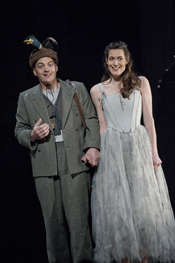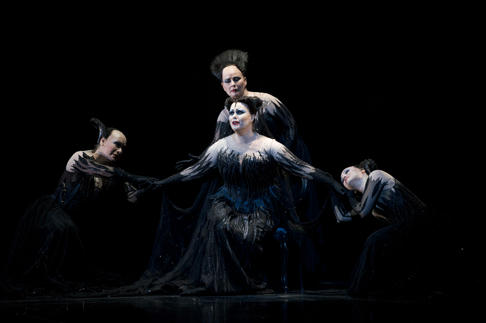This production’s first and only Sarastro, Franz-Josef Selig, steps back
into the High Priest’s hallowed shoes; several esteemed soloists from the
2008 run return – Christopher Maltman reprising his confident, mischievous
Papageno, and Kate Royal once again presenting a dignified and elegant Pamina.
With the original conductor, Sir Colin Davis, at the helm, a smooth sailing
should be guaranteed; however, there were a few unexpected wobbles on this
opening night, and if the ship didn’t hit the rocks it certainly lost its
moorings on occasion.
John Macfarlane’s designs are still strikingly sumptuous: effortless
transitions between lavish tableaux, packed with period details and evocatively
lit by Paule Constable, transport one — as if gliding aloft a magic
carpet — to other worlds. Die Zauberflˆte is a compendium of
styles, forms and moods: Masonic mysticism rubs shoulders with pantomime farce;
erudite Enlightenment philosophy sits alongside an earthy tale of human
endeavour and love. And McVicar and his designer, John Macfarlane, skilfully
conjure and combine these domains: scientific astronomical apparatus whisk us
back to an empirical eighteenth-century, the sweeping glare of an outsized
crescent moon casts a supernatural spell. So, it is perhaps all the more
surprising that a few ‘false notes’ are allowed to creep in.
 Christopher Maltman as Papageno and Kate Royal as Pamina
Christopher Maltman as Papageno and Kate Royal as Pamina
Maltman’s Papageno is warm-hearted and exuberant. Although perhaps not
exploiting the full colour range and power of his increasingly varied palette
and rich baritonal resonance, Maltman revelled in the moments of comedic
flippancy and fun; admittedly this was sometimes at the expense of rhythmic
precision, and he occasionally lost touch with the pit — thereby
unintentionally emphasising the bird-catcher’s anarchic streak.
As Sarastro, Franz-Josef Selig, struck an imposing physical figure: regal,
poised and self-possessed. His diction was impressive (alone among the cast,
his is singing in his native tongue), and although he took a little while to
settle down in, particularly in the middle range, his performance was
commanding and secure.
Kate Royal’s soprano is strong, sure and gorgeous in tone, but while
gracious and composed, I feel that physically and vocally she lacks some of the
child-like naivety which is integral to the role of Pamina. There was no
doubting the beauty and grace of her vocal line. Her duet with Papageno,
‘Bei M‰nnern, welche Liebe f¸hlen’, was achingly touching, but was
equalled in affecting loveliness by ‘Ach, ich f¸hl’s’.
Royal’s strength and control were not quite matched by her Tamino, Joseph
Kaiser, and this was particularly noticeable in the lover’s
‘reunion scene’. Kaiser’s portrayal was rather
one-dimensional but he compensated for some occasionally wooden acting with a
flexible, light voice aptly conveying the youthful optimism and bravery of the
idealistic hero.
 From Left To Right: Elisabeth Meister as First Lady, Jessica Pratt as Queen of the Night, Kai R¸¸tel as Second Lady and at the back, Gaynor Keeble as Third Lady
From Left To Right: Elisabeth Meister as First Lady, Jessica Pratt as Queen of the Night, Kai R¸¸tel as Second Lady and at the back, Gaynor Keeble as Third Lady
As the Queen of the Night, Jessica Pratt, making her role and house debut,
had all the notes, and hit them cleanly. While her top notes were warm and
true, without a hint of stridency or loss of power, her lower register
projected less well and she did not really convey the menace of the would-be
murderer. A general lack of dramatic and musical subtlety, as in the recitative
to her first aria, ‘O zittre nicht’, diluted the impact of the
Queen’s vengeful terrorising.
British tenor, Peter Hoare, was an eccentric Monostatos, who in this
production is made to bear the bulk of the burden for creating comedy and
lightness. A caricature villain, he is less dangerous racial threat, the
embodiment of ‘otherness’, and more a harmless, if ridiculous,
be-wigged dandy, the epitome of vanity. Matthew Best was an authoritative
Speaker, imperiously directing Tamino to the ‘right path’,
effectively establishing a moment of dramatic gravitas at the end of Act 1.
Several Jette Parker Young Artists were given opportunities to shine. The
First and Second Ladies, Elisabeth Meister and Kai R¸¸tel respectively, were
joined by the more experienced Gaynor Keeble to form a well-blended trio. Their
stage-craft, however, seemed rather undirected, particularly in the opening
scene where, given that the hand-manipulated, puppet serpent (just one of many
of McVicar’s overt debts to eighteenth-century theatrical paraphernalia),
though wonderfully charming, hardly chills the blood. Thus, the black-clad
Ladies need to generate an air of peril and intimidation; but, rhythmic
co-ordination was a little wayward and there was a lack of projection. As
Papagena, JPYA Anna Devin — attractive both vocally and physically
— should have been an irresistible ‘catch’ for Papageno. But,
inexplicably, she was presented not as a beauty disguised as a beggar, but in
attire more fitting for a bordello boudoir — no wonder Papageno looked
away in disgust.
The chorus was rather ragged and some of the responsibility for the poor
ensemble must rest with Sir Colin Davis, a supremely experienced Mozartian, but
who nevertheless failed to pace this production effectively. After a
wonderfully stately start to the overture — where the warm weight,
focused intonation and glossy sheen of the horns powerfully established the
mood of Masonic majesty — the Allegro failed to catch fire, and
the spark of conflict and contrast which should drive the opera forward was
never quite ignited. (Moreover, the orb-carrying extras wandering rather
purposelessly through the stalls hardly helped matters.) Davis chooses to
ignore the period performance specialists’ preference for pace and
nimbleness; but while this should not prevent an effective dramatic momentum
being achieved, some of the tempi were overly ponderous — particularly
the Priests’ March and Sarastro’s ‘O Isis and Osiris’
at the opening of Act 2 which was decidedly sluggish. Indeed, even Selig lost
contact with the pit, a rare moment of discomposure. Davis was however
sensitive to the soloists, controlling dynamics and texture to provide
appropriate accompanying support, especially in the case of the Three Boys
(Jacob Ramsay-Patel, Harry Stanton and Harry Manton) who shone through —
and stayed in time …
Overall this was an enjoyable, if slightly unsatisfactory, opening night.
Perhaps insufficient time was allotted to this well-known revival; if so,
things should improve as the run progresses.
[Die Zauberflˆte continues in repertory until Saturday 19
February.]
Claire Seymour
image=http://www.operatoday.com/ZAUBER-1024_0580-KAISER-AS-.gif
image_description=Joseph Kaiser as Tamino [Photo by Mike Hoban courtesy of The Royal Opera House]
product=yes
product_title=W. A. Mozart: Die Zauberflˆte
product_by=Tamino: Joseph Kaiser; Pamina: Kate Royal; Papageno: Christopher Maltman; Queen of the Night: Jessica Pratt; Sarastro: Franz-Josef Selig; Monostatos: Peter Hoare; Speaker of the Temple: Matthew Best; Papagena: Anna Devin; First Lady: Elisabeth Meister; Second Lady: Kai R¸¸tel; Tird Lady: Gaynor Keeble. David McVicar, Director. Colin Davis, Conductor. John Macfarlane, Designer. Paule Constable, Lighting designer. Leah Hausmann, Movement director. Lee Blakeley, Revival director. Royal Opera House, Covent Garden, London, Tuesday 1 February 2011.
product_id=Above: Joseph Kaiser as Tamino
All photos by Mike Hoban courtesy of The Royal Opera House